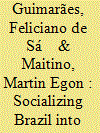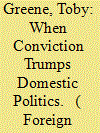|
|
|
Sort Order |
|
|
|
Items / Page
|
|
|
|
|
|
|
| Srl | Item |
| 1 |
ID:
164667


|
|
|
|
|
| Summary/Abstract |
This piece examines empire by purchase and lease in the Pacific and the manner by which the United States gained control over a series of strategically valuable islands in the region. Because Washington obtained its possessions partly through purchase and lease, and not via invasion, it argues that the United States can hide its standing as an empire. Therefore, this research suggests that the literature on empire, order, and hierarchy in international relations needs to allow for a more expansive definition of empire to better understand this important but understudied concept.
|
|
|
|
|
|
|
|
|
|
|
|
|
|
|
|
| 2 |
ID:
164666


|
|
|
|
|
| Summary/Abstract |
This article scrutinizes the role of diplomats in foreign policy by focusing on the case of Sir Percy Loraine, British ambassador to Turkey (1934–1939). Accordingly, the article first introduces an agent-centered framework claiming that the ability of diplomats to make their mark on foreign policy is contingent upon how they fare in overcoming two types of dilemmas on diplomatic duty: the mandate dilemma and the allegiance dilemma. The article then discusses how Loraine overcame these dilemmas with a particular focus on his mediating role in the establishment of bilateral economic and political partnership. Overall, the article argues that diplomats can make a difference in the conduct of foreign policy by influencing not only the host government but their own government as well, provided that they find a balance between following orders and using own discretion and between their loyalty to the government they represent and responsibility to the receiving government.
|
|
|
|
|
|
|
|
|
|
|
|
|
|
|
|
| 3 |
ID:
164668


|
|
|
|
|
| Summary/Abstract |
What drives Russia's Baltic policy? To answer this question, I develop a neoclassical realist framework that explains how local great powers act toward neighboring small states. In brief, the framework argues that local great powers face strong systemic incentives to establish a sphere of influence around their borders. Toward that end, they can employ positive and negative incentives. The general rule is that the higher the level of external pressure, the more assertive the policies pursued by the local great power. However, this simple relationship between external pressure and regional assertiveness is moderated by two variables: (1) the ability of small states to obtain security guarantees from extra regional powers; and (2) the level of state capacity of the local great power. The article develops this theoretical argument and shows that it goes a long way to explain the overall pattern and evolution of Russia's Baltic policy over the last two decades.
|
|
|
|
|
|
|
|
|
|
|
|
|
|
|
|
| 4 |
ID:
164670


|
|
|
|
|
| Summary/Abstract |
In this article we explore the role of the Somali diaspora in Norwegian foreign policy towards Somalia through an in-depth case study. This empirical study sheds new light on the foreign policy impact of ethnic lobby groups by demonstrating three important points: 1) diaspora organizational strength can only be understood fully by taking a transnational approach, 2) diaspora lobbying attempts depend on interaction between diaspora and decision makers, and 3) in order to understand the potential success of diaspora lobbying, internal fragmentation as well as potential points of agreement need to be recognized. In order to incorporate these points, we suggest a theoretical model that bridges literature on the foreign policy impact of ethnic lobby groups and work on the transnational political ties of migrants. Our model adds the transnational ties and resources of diaspora and feedback loops between states and diaspora into ethnic lobby literature models on conditions for successful lobbying. This model will benefit future studies on the role of other diaspora groups in foreign policy formation towards their country of origin.
|
|
|
|
|
|
|
|
|
|
|
|
|
|
|
|
| 5 |
ID:
164663


|
|
|
|
|
| Summary/Abstract |
Groupthink is one of the most popular and extensively discussed approaches in studying small group decision-making. However, the methodological question of how to make concurrence-seeking, as the key element of groupthink, visible has received insufficient attention. To make group decision behind closed doors more visible and methodologically advance groupthink theory, I introduce Discourse Network Analysis and apply it to the US invasion of Iraq in 2003. Results demonstrate that the US decision to go to war was based on a sudden and undisputed threat-perception that exhibited hasty concurrence-seeking. Given this threat-perception, and a fierce struggle between advocates of a diplomatic solution and supporters of a military response, the United States chose a military strategy—one that inevitably resulted in war.
|
|
|
|
|
|
|
|
|
|
|
|
|
|
|
|
| 6 |
ID:
164661


|
|
|
|
|
| Summary/Abstract |
In this article we show that small powers are able to socialize regional leaders using altercasting strategies. The altercasting operates within the leader's role repertoire replacing the master role—natural leader—with a previously inactive role—regional paymaster. This process is only possible because altercasting empowers domestic oppositions and recalcitrant secondary powers against the leader's initial master role, which is perceived as inadequate or unfair, unbalancing the leader's decision-making process towards an entire master role remaking. Since the regional community is a projection of the regional leader's values and interests, altercasting represents an effective bottom-up strategy available for small powers to socialize regional leaders and change their local community. We propose a theory refinement on master role transitions based on a mechanism that incorporates altercasting, domestic, and regional contestation concepts. We develop our argument using a case study—the 2006 Bolivian gas crisis.
|
|
|
|
|
|
|
|
|
|
|
|
|
|
|
|
| 7 |
ID:
164665


|
|
|
|
|
| Summary/Abstract |
It has been argued that domestic political survival is key to political decision making, including in foreign policy. Poliheuristic decision theory claims that “Politicians will not shoot themselves in the foot by selecting alternatives that are likely to have a negative effect on them politically.” How then does one explain a foreign policy decision which causes grievous harm to the political position of the decision maker? The paper reviews existing research on personality and environmental factors which may reduce the significance of domestic political constraints on foreign policy decisions. It then examines Blair's response to the 2006 Israel-Hezbollah conflict, in which his support for Israel triggered a backbench revolt forcing him to announce he would step down within 12 months. The account demonstrates that Blair was aware of the potential political costs of his position, but stuck to it regardless. By seeking to explain why this case diverges from theoretical expectations, the paper generates new hypotheses about how personality and environmental factors may lead to leadership convictions, and not domestic political survival, being the ‘essence of decision’.
|
|
|
|
|
|
|
|
|
|
|
|
|
|
|
|
| 8 |
ID:
164669


|
|
|
|
|
| Summary/Abstract |
Why do small states sometimes defy the behavioral expectations of powerful allies? Realism would suggest that they would not only ally themselves with more powerful states to ensure their security but would maintain that security through an accommodative strategy toward their protector once an alliance had been formed. Yet, this does not always happen; and the present article, building on Harnisch's (2014) pioneering effort to integrate role theory and the two-level game metaphor, investigates why. It offers and tests the hypothesis that, when small states prioritize their domestic role conceptions in formulating their foreign policy, they defy the behavioral expectations of more powerful allies. The 2014 visa revocation crisis between Hungary and the United States is used to illustrate this process: and contrary to what the literature suggests, the finding is that ego-dominated role-taking in international relations remains possible today even for small states.
|
|
|
|
|
|
|
|
|
|
|
|
|
|
|
|
|
|
|
|
|